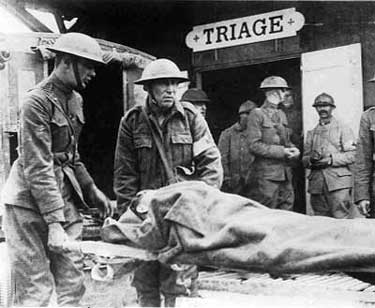Excel and I are having a fight, so the Turing Test results will go up tomorrow, after I beat the program into submission. In the meantime…
Calah Alexander and Melinda Selmys had two really great reaction pieces to Pope Francis’s interview that I’d like to share. First up, Melinda Selmys has an essay up at Spiritual Friendship titled “Field Hospital for the Wounded.” She picks up on Pope Francis’s language, and expands the metaphor to talk about how to evangelize without exacerbating the pain of those you’re trying to help.
Let’s contextualize this… experience in terms of Francis’ notion of the Church as field hospital. I happen to have handy a little text-book on military triage, and I find in it two principles that I think are relevant. The first is that if you don’t know what you’re doing and the patient is badly injured but not at the point of death you should do nothing. Hold the person’s hand, talk nicely to them, reassure them until the doctor gets there. The second is that there are some kinds of wounds that can be treated by anyone who knows first aid, but many can only be treated by a specialist. Even if the wound is potentially life-threatening an unskilled medic may do more harm than good and they may make it difficult, or even impossible, for effective treatment to be applied once the patient receives more qualified medical care. Note that this is a book on military medicine: these caveats are addressed to people who are trained to work in field hospitals.
Relations between the Church and the gay community involve a lot of very old, very deep wounds—some of them infected, most of them involving severe complications. Someone with a superficial knowledge of the subject matter cannot address it effectively, particularly in a single presentation. Words like “bigot” and “homophobe” are the gay community’s way of saying “Ow! You’re hurting me. You don’t know what you’re doing. Just leave me alone.” Nor is this an irrational response. We all have the right to insist that amateur medics not attempt emergency surgery on us, particularly without anaesthetic.
The anger that Christians so often seem to feel when they receive this rebuke is, I think, instructive in telling us part of what’s wrong with the approach that tends to be taken. If I go to help someone, and they refuse my help, I shouldn’t be mad. In so far as their refusal makes me angry, that anger is evidence that my help is in some way self-serving.
Calah picked up similar themes in her post today (“Seek God in Every Human Life”). She writes:
Someone said to me the other day that it’s hard to find a perfect strategy for fighting a mean-spirited, narcissistic movement. I think the crux of the issue is right there. “Fighting a movement.” It’s easy to be angry, bitter, or downright hateful toward a movement…
When you get right down to it, even the idea of “people” is an abstraction. It’s easy to hate an abstraction, because you don’t have to deal with the consequences. The gay marriage movement can’t have its feelings hurt, can’t be wounded, can’t be hurt or scarred or angry by the way anyone treats it or talks about it. Same goes for the anti-gay marriage movement. So everyone feels like they have carte blanche to say what they want without the risk of damaging a human soul, because they’re talking about a movement, lots of people, not a person, not that person, not you, not me. But they don’t. There is no such thing as “people”. There is only a person, many persons, each of them with a soul beloved of God.
Interacting with a person means treating their pain as, at the very least, data. A doctor may have no choice but to hurt in order to heal, but she secures the trust of the patient first, and thinks hard about whether there’s any other way to address the injury or provide palliative care.
In my case, I don’t oppose civil gay marriage, so this is seldom the field in which I end up doing triage. But when I disagree with friends in other areas related to sexuality and ethics (say, casual hookups), I don’t open by asking the person to repent. I try to be genuinely curious about how we both think about relationships and how to show respect for a partner.
After all, I’m most concerned that a friend is acting ethically to the best of their own understanding. And then we can jump into metaphysics and philosophy and try and untangle how we ended up in two different places in normative ethics. But the first step is trying to see whether the person is doing the right as God gives them to see the right, and working out how to improve our vision and understanding as we go.













